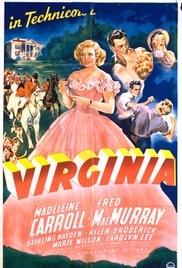Plot
At the train station of the fictional Fairville, Virginia, an African-American man named "Carburetor" is playing the guitar and singing. Stonewall Jackson "Stoney" Elliott and his daughter, "Pretty", watch the arrival of a train that has brought Charlotte "Charlie" Dunterry to town.
Charlie was born in Dunterry but has lived in New York where she worked in show business. She has returned to Fairville to sell the Dunterry estate where she was born and which she has inherited. Stoney and Charlie realize that they were childhood friends as he drives her out to the property.
Stoney is married but estranged from his wife who lives in Europe. He lives with his daughter and his cousin, "Miss Theo", in a modest home near the Dunterry property.
Charlie discovers that the 150-year-old family home, a large Colonial house designed by Thomas Jefferson, is in poor condition. Aunt Ophelia, an African-American servant who was present when Charlie was born, welcomes her back to the family home and takes her on a tour of the estate.
Norman Williams is a wealthy carpet bagger who has purchased the adjacent Elliott estate that was formerly owned by Stoney's family. Williams begins to court Charlie.
Electing to remain in Virginia and restore the Dunterry estate to its former stature, Charlie develops feelings for Stoney, but his marital situation causes him to resist. A frustrated Charlie accepts a marriage proposal from Norman, who then hides from her the knowledge that Stoney's wife is dead. Only on their wedding day does Norman's conscience persuade him to tell Charlie the truth, allowing her to follow her heart.
This page is based on this
Wikipedia article Text is available under the
CC BY-SA 4.0 license; additional terms may apply.
Images, videos and audio are available under their respective licenses.
